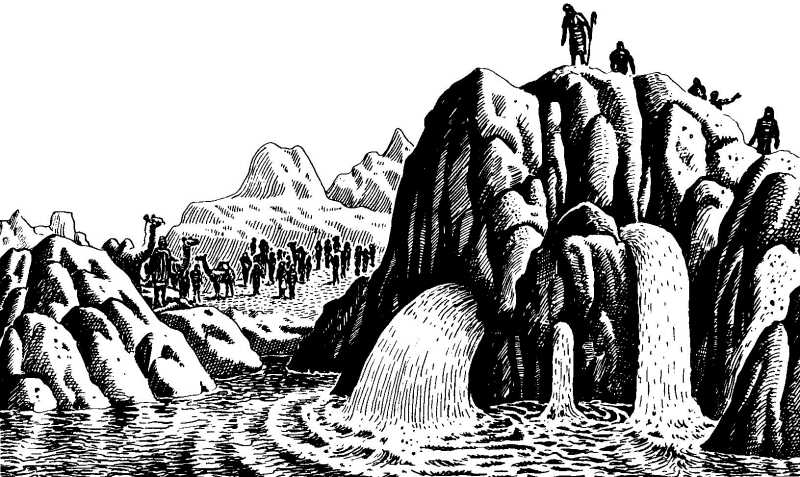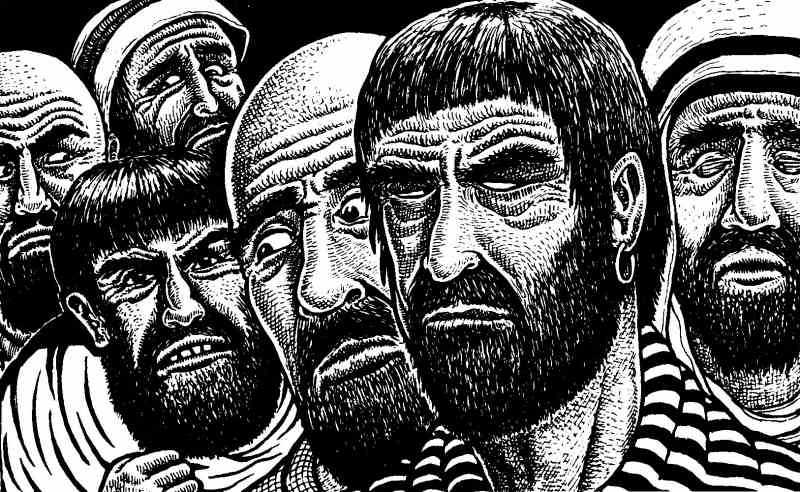THAT evening the Israelites were surprised to see the sky darkened by vast flocks of birds. This appeared to be an unusual migration of fowl to a more satisfactory climate.
Suddenly the birds swooped ground-ward, alighting right among the people! Because the birds were weary from what had obviously been a long flight, they were very easy to catch. Within minutes uncounted thousands of these plump quail, excellent for eating, were being prepared for dinner.
Next day there was another miracle. During the night dew had settled on the plants around the camps. Instead of being covered with moisture next morning, the plants were decked with small, flaky white particles. This was puzzling until Moses made the surprising announcement that it was the bread God had promised.
"Early every morning three quarts of this food should be gathered for every person," Moses disclosed. "If it isn't taken in early, it will melt on the plants under the hot sun. And don't try to keep it overnight, or it will spoil."
The people swarmed out around their camps to easily gather the food, which they later named manna. To their enjoyment, they found it tasted like fresh bread and honey. Those who were late in gathering it found little. Most of it had melted. In spite of Moses' warning about keeping it overnight, some did just that, only to find that it became disgustingly odorous and worm-infected. (Verse 20)
The Sabbath Commanded
One day not long after the manna first showed up, Moses told the people to gather twice as much the next morning. Two days later no manna appeared. That day was the weekly Sabbath. Furthermore, the extra manna gathered for the seventh day miraculously remained fresh and pure as it was when collected. (Verses 24-26)
Observing the Sabbath day properly was important to God and man. Nevertheless, some spent much of the morning hours of the Sabbath searching for manna that wasn't there. This was so displeasing to God that He instructed Moses to tell the people to stay close to their tents on the Sabbath and refrain from working. After that, for a time, there was more obedience in this matter.
The cloud continued to lead southeast and into a mountain range. A hot, upgrade march faced the people just at a time when their water supply was dangerously low. The next time the Israelites camped, a noisy crowd of them surrounded Moses' tent to loudly accuse their leader of purposely taking them into the desert to meet death. (Ex. 17:1-3)
Water from a Rock!
Again Moses asked God to calm the complainers, who were only causing others to be troubled. God told Moses, who feared some of the angrier people would try to stone him to death, that he should take some of the elders and go on ahead to a certain large rock, which he was to strike with the shepherd's rod he had used in Egypt. Moses did as he was told. Out gushed streams of clear water which coursed down toward the Israelites' camps! (Ex. 17:5-6)

Crystal-clear water gushed out in great quantity from the openings in the rock!
|
The sight of water flowing past their tents and on down toward the rear of the column brought joyful surprise to the excited people. At first the stream was murky from picking up dirt from the ground, but with each passing minute of the flow it became clearer and more drinkable. When the people learned from the elders who had accompanied Moses that the water was gushing from a boulder of granite where there had previously been no sign of it, they marveled at the miracle. Those who had threatened Moses regretted doing so. They wouldn't have acted so childishly if they had relied on God. (Verse 7)
Because of the wonderful supply of water, the Israelites hoped they could stay a few days in that area, which was close to where Moses had shepherded flocks a few years previously. Days passed. The cloud continued to remain motionless, which was a sign to stay.
An Enemy Arrives
However, the Israelites would have been troubled greatly and might have wanted to move on if they could have known that from some nearby foothills, many pairs of crafty eyes were watching from time to time to determine their numbers and their possessions.

Some of the swarthy, bearded Amalekite prisoners appeared fearful.
Others glowered sullenly at their captors.
|
The attack on the Israelites came at night. Moses wasn't very surprised. He was aware that the region was roamed by bands of hostile desert bandits who used darkness and surprise to further trouble their victims. He also knew these men were Amalekites, descendants of Esau, twin brother of their forefather Jacob. Their attackers were therefore their distant cousins.
Joshua Comes on the Scene
After the Amalekites attacked and fled, one of Moses' officers, a young man named Joshua, was given the responsibility of mustering an army of defense from among the Israelites. The Amalekites were expected to attack in greater force next day. Joshua had little time to assemble the men. (Ex. 17:9)
The Israelites' first battle with an enemy was an unusual one. Hordes of fierce, wily desert swordsmen charged in among thousands of untrained men armed mainly with ordinary knives, clubs and weapons taken from drowned Egyptians. Moses was up on a high ridge where he could view the fray. With him was Aaron and a brother-in-law, Hur. It appeared that the Israelites were facing certain defeat. Moses called to God for help, holding his shepherd's rod above him as he had done to signal divine power at the time of the plagues.
It was difficult to determine, in the first few minutes of fighting, which side was gaining the upper hand. Then it began to be obvious the Amalekites were falling into retreat. When Moses was certain of it, he relievedly lowered his arms, which were becoming weary. Almost immediately the situation changed. With renewed energy the Amalekites charged back, causing the Israelites to retreat.
Realizing his relaxed attitude affected the fighting, Moses again held the rod up. The startling result was that the tide of battle swung back in favor of his men. However, he was becoming too tired in his arms to maintain that prayerful position. Again he lowered the rod and again the Amalekites pushed the Israelites back!